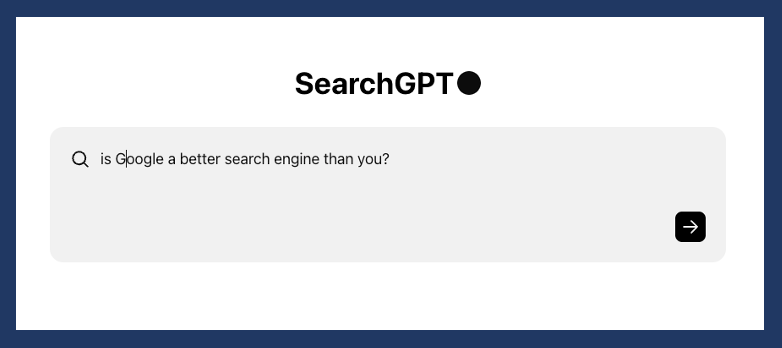Google Legal Woes, SearchGPT Not Enough, Danny Sullivan

Google's Legal Woes Mount
In many ways Google has never been more successful or powerful; 2023 ad revenue was $238 billion. But the company has probably never been more legally vulnerable either. Google suffered a major setback last month when it lost its landmark US antitrust trial in federal court. Now the US Department of Justice (DOJ) is likely to push for a structural remedy (breakup of some sort) in phase two of that case. And this week, Google's second antitrust trial began in Virginia. It focuses on Google's ad network business (formerly AdSense) and its power over publishers. If successful, the DOJ will push for the divestiture of Google Ad Manager (formerly DoubleClick). Google says it's surrounded by competitors and only winning because it's better and more innovative. That's essentially the argument it used unsuccessfully in the earlier trial. And just last night, Google lost its shopping search case in The European Court of Justice. Here's the short version: Google's favoritism toward its own Google Shopping results in the SERP violated EU antitrust law (Article 102 TFEU). This suggests, by implication, that any top-of-the-page features that direct users to other Google properties or results (e.g., Local Finder, Hotel Finder) are illegal and will suffer the same fate.

Our take:
- The implications of the EU's highest court decision are far reaching. David Mihm will explore them in a forthcoming article.
- Europe is moving closer to regulating the SERP itself, which may be necessary but is also highly problematic in many ways.
- As Europe steps up global regulation of tech companies, some are criticizing its regulatory frameworks as being hostile toward innovation.
Study: SearchGPT Lacking, but Improving
SearchGPT is still a prototype but that doesn't stop the head-to-head comparisons with Google (including my informal one). The latest comes from SE Ranking, which compared Google and SearchGPT results during the week of August 19. The company examined a small sample of 36 keywords covering an array of query types and search intents: informational, navigational, transactional and local. The evaluation was based on several criteria: quality and quantity of URLs displayed, presence of SERP features, domain diversity and freshness and relevance of results. The findings are very detailed. Local results were focused on New York and London. Much of the SearchGPT analysis was manual, hence the small sample. As you might expect, the study found that Google results were superior in most instances but that SearchGPT was strong for informational queries and improving overall, including in local. We know that OpenAI is using the Bing index. Accordingly, SE Ranking found that SearchGPT results were "73% similar to Bing and 46% to Google." SE Ranking also observed, "26% of URLs ranking in SearchGPT receive no traffic from Google, suggesting new visibility opportunities." SE Ranking faults SearchGPT for having fewer URLs, lacking SERP features (e.g., video, maps), having less varied results and "outdated content."

Our take:
- It's very clear that SearchGPT is not an existential threat to Google. Over time that could change, but it's unlikely. Google's legal problems are a wild card.
- Google has conditioned our expectations about what search is and what a SERP looks like. Accordingly, there's a hint of that bias in the comparison.
- In its own defense, SearchGPT says, "Unlike Google, which provides a list of links to users, I also offer contextualized and summarized information from my background knowledge."
Google Search Liaison Interview
Barry Schwartz's extensive interview with Google Search Liaison Danny Sullivan is a bit of an inkblot test, depending on how you feel about Google and/or Danny in particular. Regardless, there's a lot in there for SEOs – though unfortunately not a lot of reassurance. The interview covers core updates, ranking changes, the Helpful Content Update, AI, Reddit and forums, Navboost (though not really) and other topics. The TL;DR version boils down to this: at Google, we're not perfect, we're trying hard to reward good content and independent sites; we know we can do better but don't expect anything immediately. I worked directly with Barry and Danny for years at Search Engine Land and its predecessor site. I'm sure Danny's sincerely doing his best within the boundaries of what he can say. My view is that Google has simply amassed too much market power and now has the power of life and death over many small publishers. Google is not a benevolent dictator. It's totally self interested and its primary focus is quarterly revenue growth. Everything else matters only to the extent it's instrumental for that purpose.

Our take:
- Most of the comments on the post were critical, cynical and/or expressed frustration though a few were positive.
- Unfortunately the interview doesn't delve very deeply into the degree to which Google relies on clicks and other behavioral signals to rank sites.
- Google's argument that publishers and site owners should just create "helpful content" would have more credibility if it truly rewarded the best content.
Recent Analysis
- Google and Booking: The Symbiotic Gatekeeper Relationship in European Hotel Search, by David Mihm.
- Near Memo episode 173: (From the Vault) The Google Review Fraud Landscape in Maps & LSA and How a Business Should Respond.
Short Takes
- GBP broken appointment links get notifications from Google.
- Study: SERP features depress clicks to organic sites (see also).
- Visual illustration of business hours' impact on rankings.
- What to know before embarking on local linkbuilding.
- Holiday shopping: 13% will use AI tools ChatGPT, up from 5%.
- Google Shopping rolling out virtual try-ons via AI tool.
- Podcast: understanding Shopping Search and Merchant Center.
- Most brands' TikTok videos fall flat, fail to capture attention.
- Ad platform Mediavine bans publisher for overuse of AI.
- All the major Apple iPhone 16 announcements.
- Apple Intelligence hallucinates according to early review (WaPo).
- Ford patents in-car system that eavesdrops for ads.
Listen to our latest podcast.

How can we make this better? Email us with suggestions and recommendations.

